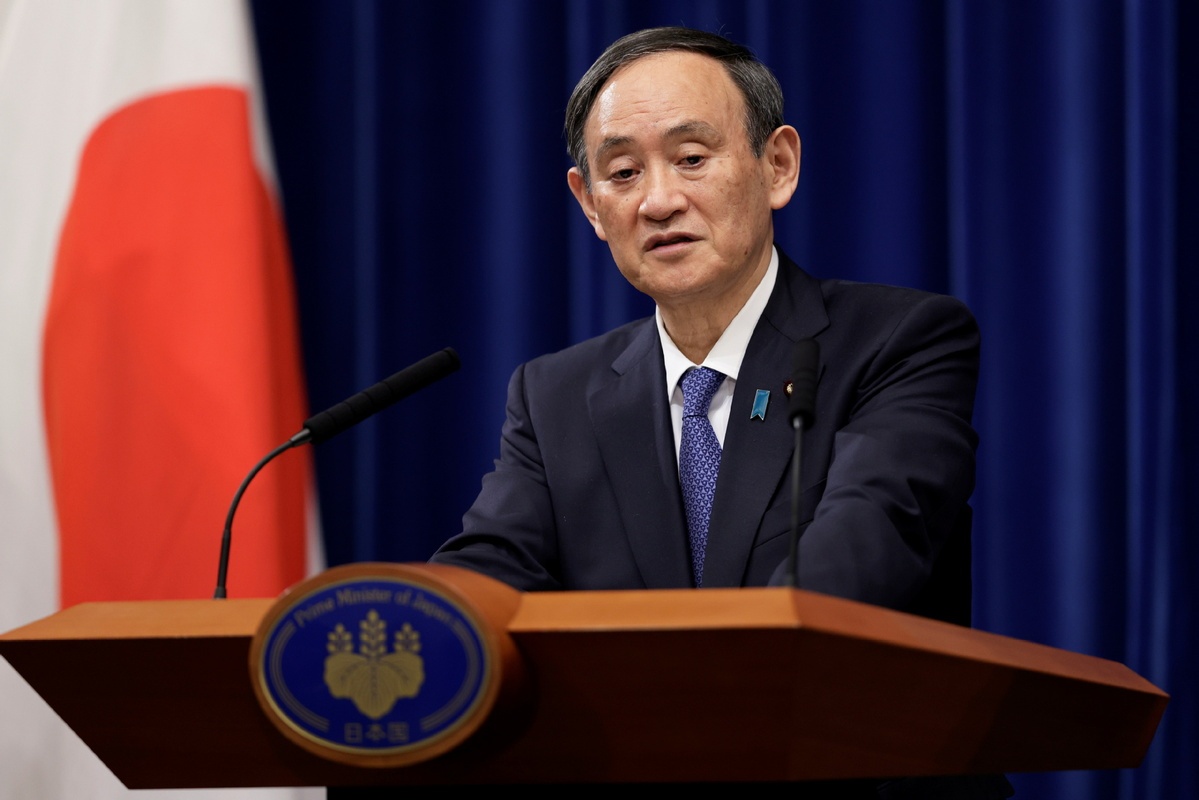
Yoshihide Suga, Japan's prime minister, speaks during a news conference at the prime minister's official residence in Tokyo, Japan January 7, 2021. (Photo: Agencies)
Japanese Prime Minister Yoshihide Suga is set to expand a state of emergency declared over the COVID-19 pandemic for the Greater Tokyo area to include Osaka, Kyoto and Hyogo prefectures as the virus is also continuing to surge in western Japan, sources close to the matter said Tuesday.
Suga told executives of the ruling Liberal Democratic Party (LDP) that he intends to broaden the initial state of emergency that came into effect on Friday for Tokyo and its three neighboring prefectures of Chiba, Kanagawa and Saitama, to cover the western areas.
Meanwhile, the central Japan prefectures of Aichi and Gifu prefectures are also seeking to be added to areas covered by the emergency virus measure.
"I want to make a swift decision on whether to include the three western prefectures," Suga was quoted as telling the executives of his LDP.
Suga, pending final arrangements, is likely to declare a new state of emergency covering the three western prefectures, government sources said.
The expanded virus emergency could be declared on Wednesday, the sources said.
Ahead of the expected expansion of the state of emergency, Hyogo Prefecture requested restaurants and bars in parts of the prefecture to close by 9 p.m.
Osaka and Kyoto prefectures meanwhile, have extended the duration of requests for shortened opening hours of restaurants and bars.
Osaka Prefecture has reported more than 3,800 new COVID-19 cases in the week through Monday, while Kyoto and Hyogo prefectures have also reported record-high daily figures as the virus' resurgence in western regions appears to show no signs of abating.
Under the state of emergency, people in the affected areas will be asked to refrain from making unnecessary trips outdoors, and restaurants and bars requested to shorten their operating hours.
Other establishments like non-essential shops and departments stores may also be asked to shorten their working hours, in a bid to curb the spread of the virus.
The recent surge in cases has underscored fears that the virus is continuing to spread rampantly across the archipelago, particularly in urban areas where medical facilities are becoming increasingly strained, with experts warning they could buckle if the virus' spread continues unabated.
Japan's first state of emergency was declared in April last year in Tokyo and six other prefectures before being expanded nationwide and then lifted incrementally in May.
The legislation giving the government the authority to declare a state of emergency was enacted in March last year.
The legislation provides a legal basis for governors to ask residents in their prefectures to stay at home and also enables stronger steps to deal with outbreaks, including the requisition of medical supplies and food, as well as the expropriation of private land for emergency health facilities.
But the legislation does not provide a legal basis for imposing a lockdown with restrictions on the movement of people, or fines for those who leave their homes, as has been seen in numerous countries' lockdowns overseas.
As things stand, there are currently no penalties for people or establishments who fail to comply with the new measures set out, although Suga has said the government will, by proposing a legal revision this month, try to change this.
Suga has said a legal revision aimed at providing benefits for those who comply with anti-virus measures, such as complying with earlier closing times, and penalties for those who do not conform, will be sought in a parliamentary session to be convened later in January.
As the Diet affairs chiefs of the ruling Liberal Democratic Party and the main opposition Constitutional Democratic Party of Japan agreed on the plan, the amendment is expected to be approved by lawmakers in early February.


